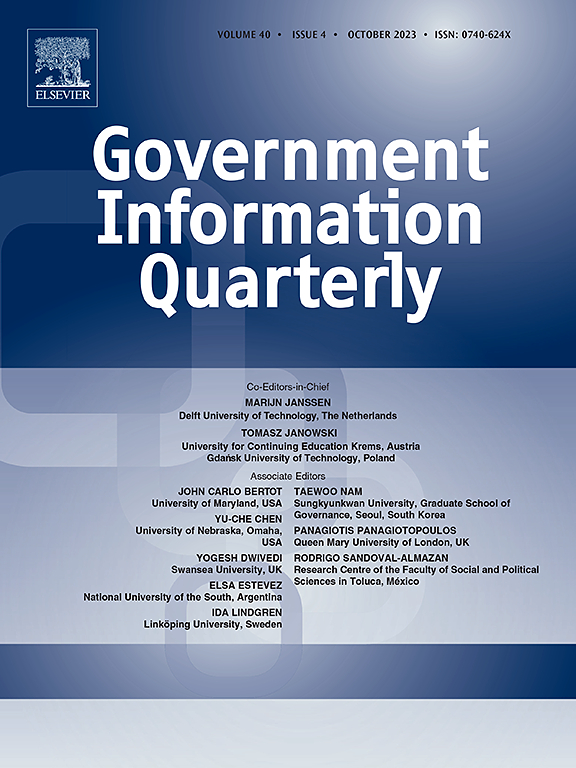基于政府开放数据的跨界数据协同复杂性探讨:以台湾为例
IF 10
1区 管理学
Q1 INFORMATION SCIENCE & LIBRARY SCIENCE
引用次数: 0
摘要
近年来,基于政府开放数据的数据驱动型协作伙伴关系的发展趋势日益明显。一些政府机构正试图与其他部门的行为者和组织形成跨界数据协作,以解决公共问题和开发创新应用。本研究在实证数据支持下,识别并探讨了跨境数据协作的动机、形式和影响因素。具体而言,本研究从数据、组织、立法和环境四个角度探讨影响因素。人们注意到,政府机构和其他部门的参与者可能具有混合的动机。此外,政府机构仍在学习和适应跨境数据协作的概念,这既是机遇也是挑战。因此,政府机构和其他部门的参与者倾向于保持一种灵活的协作结构,以在各自的倡议中保持高度的自主性和灵活性。期望本探索性研究的讨论与实际意义,能提供学术研究者与实务人员的见解。报告的跨境数据协作经验对其他国家的政府管理部门也有价值。本文章由计算机程序翻译,如有差异,请以英文原文为准。
Exploring the complexity of cross-boundary data collaboratives based on the foundation of governmental open data: A study in Taiwan
In recent years, there has been a growing trend of data-driven collaborative partnerships based on governmental open data. Some government agencies are attempting to form cross-boundary data collaboratives with actors and organizations from other sectors to tackle public issues and develop innovative applications. While research focusing on cross-boundary data collaboratives remains limited, this study explores the dynamics and complexity of related initiatives in the context of Taiwan's open government data using a qualitative research approach. This study identifies and discusses the motivations, forms, and influential factors of cross-boundary data collaboratives with empirical data support. Specifically, this study explores the influential factors from four perspectives: data, organization, legislation, and environment. It is noted that government agencies and participants from other sectors can possess mixed combinations of motivations. Additionally, government agencies are still learning and adapting to the concept of cross-boundary data collaboratives, which represent both opportunities and challenges. Therefore, government agencies and participants from other sectors tend to maintain a flexible collaborative structure to retain a high level of autonomy and flexibility in respective initiatives. It is expected that the discussion and practical implications of this exploratory research can provide insights to both academic researchers and practitioners. The reported experiences in cross-boundary data collaboratives can also be valuable to government administrations in other countries.
求助全文
通过发布文献求助,成功后即可免费获取论文全文。
去求助
来源期刊

Government Information Quarterly
INFORMATION SCIENCE & LIBRARY SCIENCE-
CiteScore
15.70
自引率
16.70%
发文量
106
期刊介绍:
Government Information Quarterly (GIQ) delves into the convergence of policy, information technology, government, and the public. It explores the impact of policies on government information flows, the role of technology in innovative government services, and the dynamic between citizens and governing bodies in the digital age. GIQ serves as a premier journal, disseminating high-quality research and insights that bridge the realms of policy, information technology, government, and public engagement.
 求助内容:
求助内容: 应助结果提醒方式:
应助结果提醒方式:


